Related Research Articles

Dark River is a 1952 Argentine drama film directed by Hugo del Carril, starring del Carril, Adriana Benetti and Raúl del Valle. It is based on a novel by Alfredo Varela. The storyline is about exploitation of peons, and the film has a populist message that ties in with the director's sympathy for Peronism. The film won the Silver Condor Award for Best Film.

Pierre Bruno Hugo Fontana, otherwise known as Hugo del Carril, was an Argentine film actor, film director and tango singer of the Golden Age of Argentine cinema.
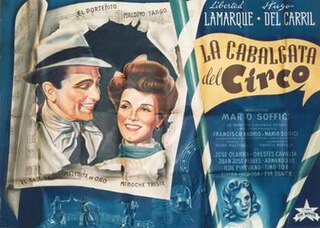
The Circus Cavalcade is a 1945 Argentine musical film directed and written by Mario Soffici with Eduardo Boneo and Francisco Madrid, during the classical era of Argentina cinema. The film was shot on black-and-white stock with a monaural soundtrack. It stars Libertad Lamarque and Hugo del Carril.
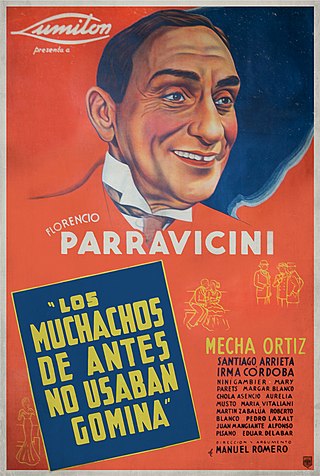
The Boys Didn't Wear Hair Gel Before is a 1937 Argentine historical drama film directed and written by Manuel Romero and starring Florencio Parravicini, Mecha Ortiz and Santiago Arrieta. It is one of the most representative films of the Golden Age of Argentine cinema.
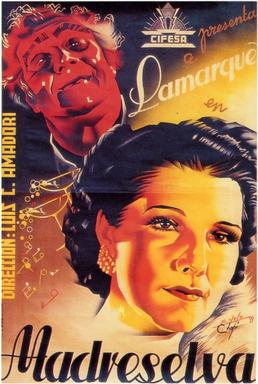
Honeysuckle is a 1938 Argentine melodrama musical film directed by Luis César Amadori. With Ivo Pelay, Amadori co-wrote the play upon which the film is based. Starring Hugo del Carril, Libertad Lamarque and Malisa Zini, it premièred in Buenos Aires on 5 November 1938 and was a popular success. Its plot is loosely based on the lyrics of a tango song of the same name. It is a tango film, an extremely popular genre during the Golden Age of Argentine cinema (1930s–1950s). It was screened at the Venice Film Festival.

La Vida es un tango is a 1939 Argentine musical film directed by Manuel Romero during the Golden Age of Argentine cinema. The tango film starred Tito Lusiardo and Hugo del Carril.

The Life of Carlos Gardel is a 1939 Argentine musical film of the Golden Age of Argentine cinema directed by Alberto de Zavalía and starring Hugo del Carril, Delia Garces and Elsa O'Connor.

Buenas noches, Buenos Aires is a 1964 Argentine musical film comedy directed by and starring Hugo del Carril. The film was premièred in Buenos Aires on October 10, 1964.
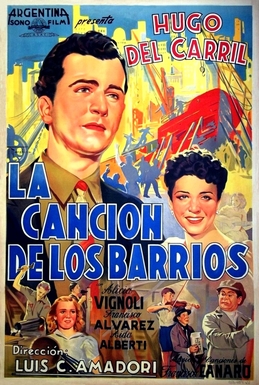
The Song of the Suburbs is a 1941 Argentine musical film of the Golden Age of Argentine cinema, directed by Luis César Amadori, who co-wrote it with Ivo Pelay, and starring Aída Alberti, Alicia Vignoli and Hugo del Carril.

When the Heart Sings is a 1941 Argentine musical drama film of the Golden Age of Argentine cinema, directed by Richard Harlan and starring Hugo del Carril, Aída Luz and José Olarra. A man from a wealthy background meets and marries an actress despite fierce opposition from his family.
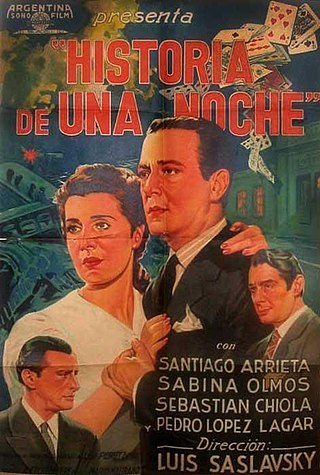
Historia de una noche is a 1941 Argentine film of the Golden Age of Argentine cinema directed by Luis Saslavsky.
The Bad Life is a 1973 Argentine crime film directed by Hugo Fregonese.
By the Light of a Star is a 1941 Argentine musical drama film directed by Enrique Santos Discépolo and starring Hugo del Carril, Ana María Lynch and María Esther Gamas. It is a tango film, an extremely popular genre during the Golden Age of Argentine cinema.
The Tango Star is a 1940 Argentine musical film of the Golden Age of Argentine cinema directed by Luis Bayón Herrera and starring Hugo del Carril, Amanda Ledesma and Berta Aliana. A tango star enjoys a relationship with a young woman from a wealthy family.
Santiago Arrieta was a Uruguayan film actor, also known as Santiago Donadío. After emigrating to Argentina, Arrieta appeared in 26 films between 1935 and 1962, and is thus notable for his work during the Golden Age of Argentine cinema

The White Land is a 1959 Argentine drama film directed by Hugo del Carril and starring del Carril, Ricardo Trigo and Amanda Silva. It is based on a novel by Juan José Manauta. It is set in a poor village in Santiago del Estero Province in Northern Argentina, where the semi-desert climate gives much of the landscape a whitish appearance alluded to in the title.
Story of a Poor Young Man is a 1942 Argentine historical drama film directed by Luis Bayón Herrera and starring Hugo del Carril, Santiago Gómez Cou and Nélida Bilbao. It is based on the 1858 French novel of the same title by Octave Feuillet, which was later adapted again in 1968. The film's sets were designed by Juan Manuel Concado. It was released during what is considered to be the Golden Age of Argentine Cinema.

Sabina Olmos (1913–1999) pseudonym of Rosa Herminia Gómez Ramos was an Argentine film actress of the Golden Age of Argentine cinema.
Pampa Film was an Argentine film production company that was active during the Golden Age of Argentine cinema in the 1930s and 1940s. It is known for its classic Prisioneros de la tierra (1939).

Beyond Oblivion is a 1956 Argentine melodrama film from the classical period, directed by Hugo del Carril and starring Laura Hidalgo and del Carril. It tells the story of a man who has lost the woman he loved and tries to turn another woman into her. The screenplay is loosely based on the novel Bruges-la-Morte by Georges Rodenbach.
References
- ↑ Rist p.202